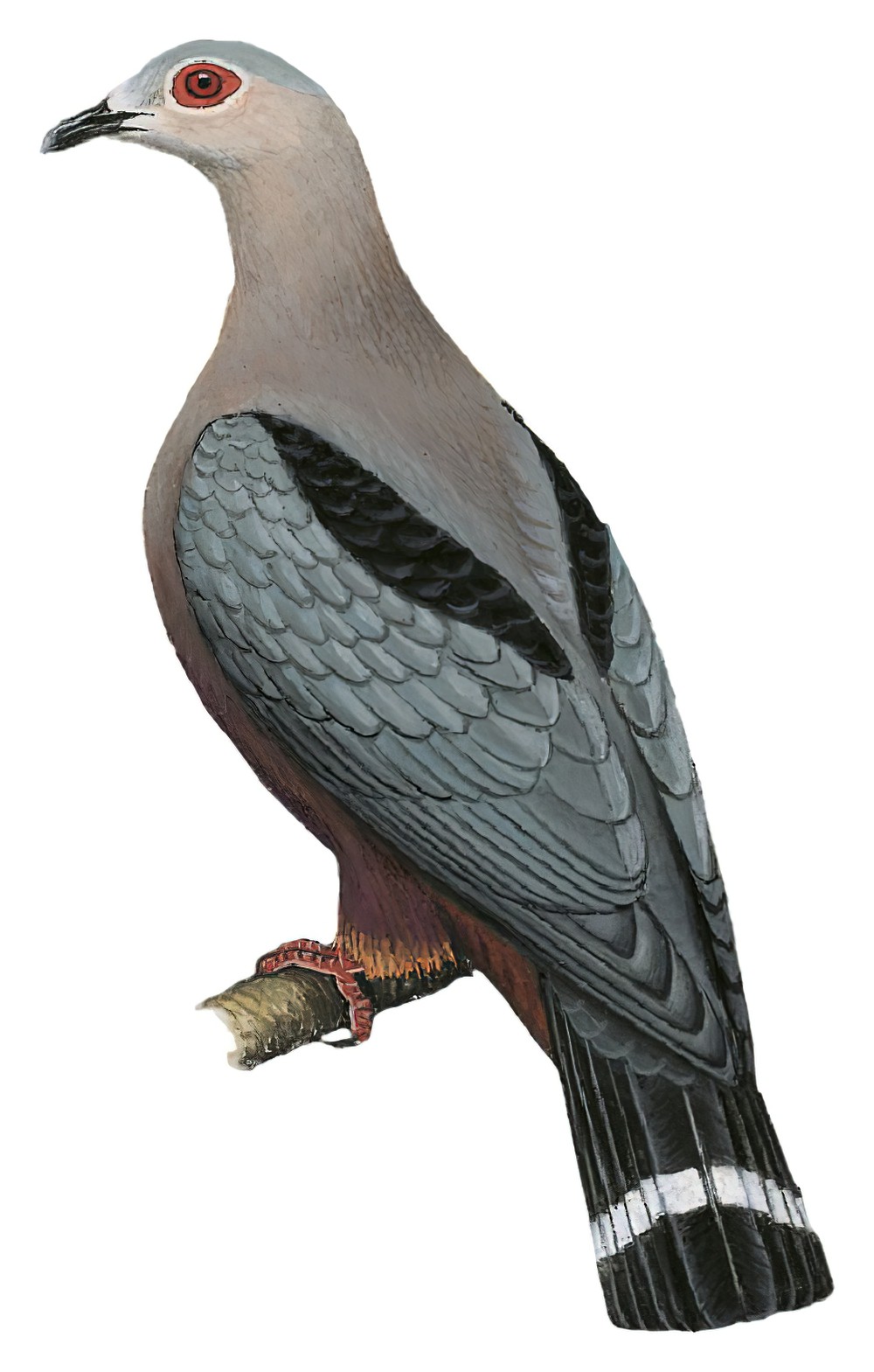Pinon’s Imperial-Pigeon / Ducula pinon

Pinon's Imperial-Pigeon
SCI Name:
Protonym: Columba Pinon Voy.UraniePhys.[Freycinet] livr.3 p.118 Atlas pl.28
Taxonomy: Columbiformes / Columbidae / Ducula
Taxonomy Code: piipig2
Type Locality: Rawak, i.e. Luwak, off Waigeu.
Author: Quoy & Gaimard
Publish Year: 1824
IUCN Status:
DEFINITIONS
DUCULA
(Columbidae; Ϯ Mountain Imperial Pigeon D. badia insignis) Nepalese name Dukul for the imperial pigeons (cf. Hindi names Dunkul and Doomkul); "Genus or Sub-genus — DUCULA nobis. — DUKUL OF THE NIPALESE (genericé) Character of the genus:—bill equal to the head, straight, cylindric, very feeble; both mandibles membranous for three-fourths from the gape; tip of the upper mandible gently inclined—of the lower, strongly compressed; nares broad, linear, obliquely transverse, central; their groove faint; their tect subtumid. Wings short, not rounded, 3, 4, 5 quills sub-equal and longest; central primaries with their tips wavily truncated. Tail 14, long, strong and square; tarsi very low, and plumed nearly to the toes laterally, less in front; toes depressed with broad flat soles; lateral fores sub-equal, hind large; nails strong, arched and acuminated; central and hind equal, lateral fores equal, less; orbits nude; plumage simple. The above is a tedious charcater, but it is a distinct one. Those who love more summary proceedings may perhaps approve the following: "Bill and wings as in Goura; legs and feet as in Vinago." ... Lastly, though Ducula, like Vinago, be exclusively arboreal and fruit-eating; the latter is eminently gregarious—the former, almost a solitary. Species new. DUCULA INSIGNIS. Great Ducula, nobis." (Hodgson 1836); "Ducula Hodgson, As. Res., 19, 1836, p. 160. Type, by monotypy, Ducula insignis Hodgson." (Peters, 1937, III, p. 42).
Synon. Carpophaga, Carpophagella, Compsoenas, Globicera, Lamprura, Muscadivora, Muscadivores, Myriphaga, Myristicivora, Phaenorhina, Pterocolpa, Ptilocolpa, Rinopus, Serresius, Zonoenas, Zonophaps.
pinon
Rose de Saulces de Freycinet née Pinon (1794-1832) wife of French explorer Capt. Louis-Claude de Saulces de Freycinet, and who accompanied him around the world (Ducula).
SUBSPECIES
Pinon's Imperial-Pigeon (Gray-headed)
SCI Name: Ducula pinon pinon/jobiensis
DUCULA
(Columbidae; Ϯ Mountain Imperial Pigeon D. badia insignis) Nepalese name Dukul for the imperial pigeons (cf. Hindi names Dunkul and Doomkul); "Genus or Sub-genus — DUCULA nobis. — DUKUL OF THE NIPALESE (genericé) Character of the genus:—bill equal to the head, straight, cylindric, very feeble; both mandibles membranous for three-fourths from the gape; tip of the upper mandible gently inclined—of the lower, strongly compressed; nares broad, linear, obliquely transverse, central; their groove faint; their tect subtumid. Wings short, not rounded, 3, 4, 5 quills sub-equal and longest; central primaries with their tips wavily truncated. Tail 14, long, strong and square; tarsi very low, and plumed nearly to the toes laterally, less in front; toes depressed with broad flat soles; lateral fores sub-equal, hind large; nails strong, arched and acuminated; central and hind equal, lateral fores equal, less; orbits nude; plumage simple. The above is a tedious charcater, but it is a distinct one. Those who love more summary proceedings may perhaps approve the following: "Bill and wings as in Goura; legs and feet as in Vinago." ... Lastly, though Ducula, like Vinago, be exclusively arboreal and fruit-eating; the latter is eminently gregarious—the former, almost a solitary. Species new. DUCULA INSIGNIS. Great Ducula, nobis." (Hodgson 1836); "Ducula Hodgson, As. Res., 19, 1836, p. 160. Type, by monotypy, Ducula insignis Hodgson." (Peters, 1937, III, p. 42).
Synon. Carpophaga, Carpophagella, Compsoenas, Globicera, Lamprura, Muscadivora, Muscadivores, Myriphaga, Myristicivora, Phaenorhina, Pterocolpa, Ptilocolpa, Rinopus, Serresius, Zonoenas, Zonophaps.
Pinon's Imperial-Pigeon (Pink-headed)
SCI Name: Ducula pinon salvadorii
salvadori / salvadoriana / salvadorianus / salvadorii
Adelardo Tommaso Conte Salvadori Paleotti (1835-1923) Italian doctor, participated in Garibaldi’s second expedition to Sicily 1860, ornithologist at Museum of Zoology, Turin University 1863-1923 (syn. Acrochordopus burmeisteri, subsp. Aegotheles albertisii, syn. Amazilia cyanura, subsp. Argya caudata, syn. Bradypterus cinnamomeus, subsp. Caligavis subfrenata, subsp. Caprimulgus macrurus, syn. Casuarius casuarius, subsp. Chalcites crassirostris, syn. Chauna torquata, syn. Corvus orru, syn. Crateroscelis robusta, Cryptospiza, subsp. Dicaeum maugei, Ducula, subsp. Edolisoma morio, subsp. Eremomela icteropygialis, subsp. Eudynamys orientalis, syn. Gerygone sulphurea, subsp. Leptocoma aspasia, syn. Lichmera squamata, syn. Loriculus philippensis apicalis, subsp. Lorius lory, subsp. Lybius undatus, subsp. Merops philippinus, syn. Micropsitta pusio beccarii, syn. Nectarinia johnstoni nyikensis, syn. Nothocercus julius, subsp. Nothura darwinii, Onychognathus, subsp. Pachycephala hyperythra (ex Pachycephala sharpii Salvadori, 1896), syn. Papualestes cyanus subcyaneus, subsp. Paradisaea raggiana, syn. Pitohui kirhocephalus, syn. Platycercus icterotis, syn. Podiceps major, syn. Probosciger aterrimus goliath, syn. Psittacula derbiana, Psittaculirostris, subsp. Ptilinopus viridis, syn. Pycnonotus erythropthalmos, Salpornis, subsp. Sphecotheres vieilloti, syn. Spilornis cheela asturinus, subsp. Tanygnathus lucionensis, subsp. Tanysiptera sylvia, syn. Tregellasia leucops melanogenys, subsp. Treron calvus, subsp. Zenaida aurita, Zosterops) (see Soter).
UPPERCASE: current genus
Uppercase first letter: generic synonym
● and ● See: generic homonyms
lowercase: species and subspecies
●: early names, variants, mispellings
‡: extinct
†: type species
Gr.: ancient Greek
L.: Latin
<: derived from
syn: synonym of
/: separates historical and modern geographic names
ex: based on
TL: type locality
OD: original diagnosis (genus) or original description (species)












